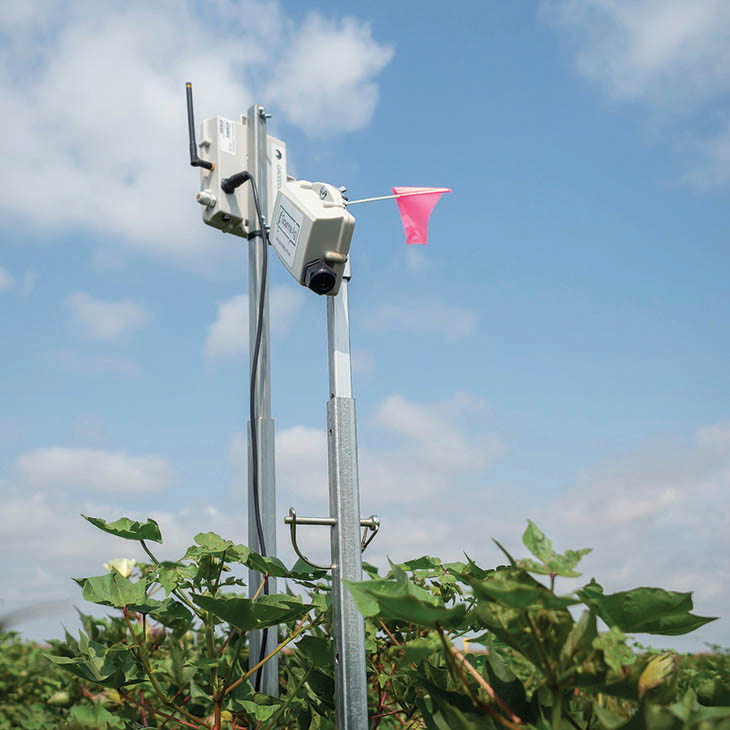
From Research to Reality
Friday, December 18, 2020
As water resources become more limited and expensive, Oklahoma State University is using collaboration to try to improve irrigation efficiency on farms throughout the state and region.
The challenge sounds straightforward: How can we persuade farmers to adopt new advances in technology and water-use protocols? Research results show clear benefits to agricultural producers who adopt these advances.
“Surveys show only about 10 percent of producers are using recent advances related to improved irrigation scheduling and technology,” said Kevin Wagner, Oklahoma Water Resources Center director and holder of OSU’s Thomas E. Berry Professorship in Water Research and Management. “There are a number of reasons for this, but the primary one given by producers is tight profit margins and the operational cost associated with investing in the newest equipment.”
The possible solution being implemented by the Irrigation Research and Extension Team with OSU’s Division of Agricultural Sciences and Natural Resources is twofold: Find, attract and work with cooperating partners who can all pull in the same direction and let producers play.
Firsthand Experience
The OSU team is going beyond the ageold model of an expert speaker providing a bunch of data-driven reasons with its Testing Ag Performance Solutions. TAPS is built on interactive, real-life farm management competitions.
“Go to any county or state fair — people enjoy a bit of friendly competition, especially with their friends and neighbors,” Wagner said. “Essentially, we let them try out research-based improved technologies and strategies using systems at Oklahoma Agricultural Experiment Station sites such as the division’s McCaull Farm and Oklahoma Panhandle Research and Extension Center in northwestern Oklahoma, and the Southwest Research and Extension Center in Altus.”
Goodbye, risk. Hello, firsthand experience.
Several partners have joined the effort, and more groups and organizations are expected. The OSU Irrigation Research and Extension Team has worked closely with the Panhandle Ag Irrigators Association, Oklahoma Water Resources Board, U.S. Department of Agriculture’s Natural Resources Conservation Service, Oklahoma Conservation Commission and universities throughout the region such as Colorado State, Kansas State, Texas A&M, New Mexico State and the University of Nebraska at Lincoln.
“The TAPS program provides a research framework where the management treatments are based on producer experiences instead of our own,” said Jason Warren, OSU Extension soil and water conservation specialist and researcher. “This allows us to better understand how producers may manage water for efficiency and compare strategies in a replicated setting to generate data that can be shared with everyone to improve success in efficient irrigation management on farms.”
Adoption Boost
Team efforts to implement a Master Irrigator program like those used by cooperating partner universities in their states are giving a boost to the focus of research-based technology and strategy adoption.
“Look at the university’s two state agencies, OSU Extension and the Oklahoma Agricultural Experiment Station system; research is designed to be the foundation of outreach efforts, with both seeking to improve the quality of life for Oklahomans, their families and their communities,” Wagner said. “As has long been said in the division, we measure our successes by how we help others to succeed.”
Master Irrigator participants focus on how to best incorporate research-based conservation irrigation practices into their operations. Many Oklahoma producers have asked the OSU team to start such a program, and that makes it easier to attract support from funding institutions and public and private agencies, Wagner said.
The National Resources Conservation Service has verbally agreed to increase Environmental Quality Incentives Program contract rankings for graduates of the Master Irrigator program. The Oklahoma Water Resources Board has agreed to provide funding for outfitting a mobile irrigation lab for the Panhandle, irrigation scheduling technology for on-farm demonstrations and soil moisture sensors for Master Irrigator program graduates.
Irrigation Team
The OSU Irrigation Research and Extension Team is an interdisciplinary group, drawing on combined expertise to help Oklahoma farmers solve production issues in environmentally and economically sustainable ways. In addition to Wagner and Warren, members include:
- Saleh Taghvaeian of the Department of Biosystems and Agricultural Engineering, whose research and Extension efforts focus on irrigation efficiency, sub-surface drip irrigation, soil moisture, remote sensing, environmental instrumentation and agricultural water management, among others.
- Robert Scott Frazier of Biosystems and Agricultural Engineering, a leading researcher in optimizing agricultural processes and enhancing quality management through applied industrial engineering.
- Sumit Sharma of the Department of Plant and Soil Sciences, who is stationed at the Oklahoma Panhandle Research and Extension Center in Goodwell and focuses his research on irrigation strategies, crop physiology and soil science.
OSU Extension Cotton Specialist Seth Byrd and Experiment Station Senior Superintendents Cameron Murley (Goodwell) and Mike Schulz (Altus) also have provided invaluable assistance, Wagner said.
